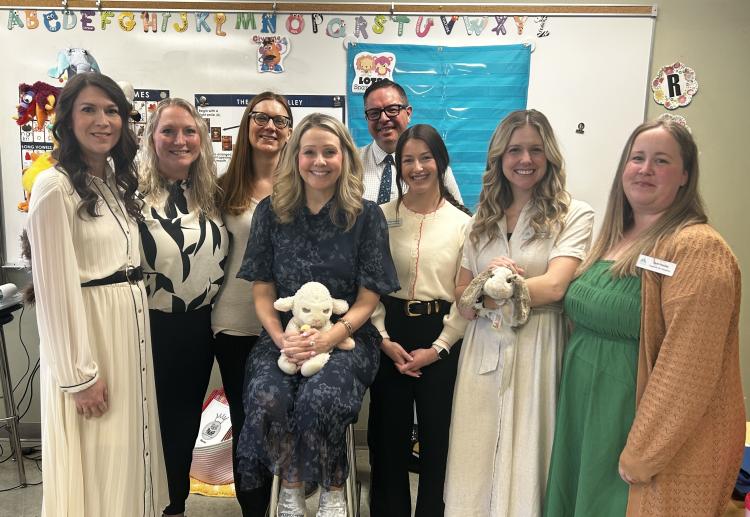Launched in June 2023, Elk Island Public Schools (EIPS) implemented its new Reading Enrichment and Development (READ) pilot project to aid eligible Grade 2 students struggling with reading at five Fort Saskatchewan schools and two rural schools. After achieving excellent results, the Division expanded the program this school year to include all elementary schools -- and has begun piloting the program with eligible students in grades 4 and 7 at specific schools.

Specialized reading interventionists at EIPS support the READ program with multi-sensory, research-based exercises and strategies for students struggling to read.
An expert team of specialized reading interventionists supports the program, visiting schools throughout EIPS. Each interventionist meets students at a school for 40 minutes, four days a week in small groups for several weeks. "When we first start working with a student, they feel like it's their fault they struggle with reading," says Tamara Martin Spady, the reading interventionist consultant at EIPS who built and oversees the program. "But once we explain the science behind why they find it difficult to read, they realize they aren't to blame. As we go through tangible, multi-sensory and engaging exercises to break down words and sound out phonemes, it builds their confidence. They start to believe in their ability -- and that leads to benefits inside and outside the classroom."
The goal of the READ program remains to improve student reading achievement through a powerful, targeted intervention program based on the science of reading. "Reading is fundamental to our daily lives. Think about how much text we see every day. For kids with a reading disability, reading is a source of anxiety and shame -- which can lead to stress and behavioural issues. Once these students have the tools they need to succeed, it's an incredible change. Not just a student's literacy skills strengthen -- their mood shifts, behaviour improves and self-worth increases."
READ has not only benefitted students. Staff, parents and caregivers have been impacted too. "Staff want to help students, and families want to help their children. In complex classrooms and busy homes, it's just not possible -- or fair -- to expect teachers or parents to address these reading disabilities fully. They see what we do in the program, and they want to know how they can support it. So, we teach them accessible strategies to apply in their daily routines."
The READ team has also offered a series of professional learning sessions centred around reading intervention to more than 150 educational assistants. "Since educational assistants work with students mostly one-on-one or in smaller groups, it makes sense to empower them with this knowledge. The feedback has been great -- and they're so enthusiastic. Several have said this is the best professional learning they've ever taken."
The success of the READ program has had a profound impact on the Division. "We're seeing so many students come out of the program reading at grade-level," says Cathy Allen, the Board Chair of EIPS. "It's amazing. READ has fostered such positive working and learning environments. Students are excited to attend school, families celebrate their child's progress at home and staff are experiencing the difference in their classrooms."
For the 2025-26 school year, Martin Spady hopes to expand the program to Grade 1 students and to provide a reading course for staff. "I'm proud of what the program has become and the potential for what it could be," says Martin Spady. "We'll continue to follow the research and adapt to what works best. Nothing can describe the feeling when a student reaches a milestone in their reading journey after working so hard. Students are just as passionate as we are about their success in reading, so that's why we're able to achieve so much together."
RELATED INFORMATION










